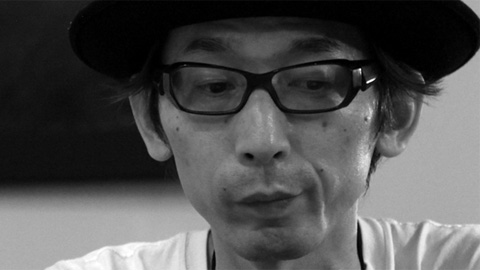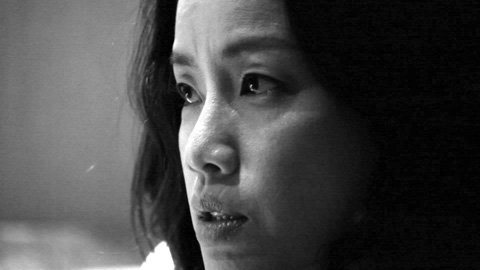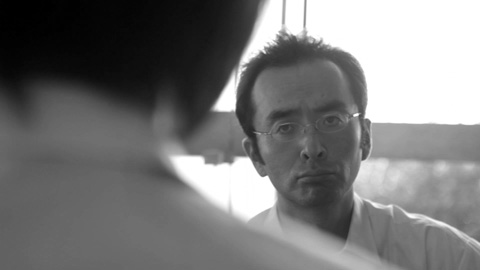Yutaka Tsuchiya
- Published
- 5 December 2012

by J.M. Hammond
Yutaka Tsuchiya (b. 1966) addresses several key concerns in his films, including the effect of media technology on society and people's own use of new technologies. Young Japanese people's search for identity is another interest Tsuchiya has explored, notably in his 1999 debut The New God, which documents his interactions with a right-wing, neo-nationalist punk group. Despite their political differences, the singer from that group went on to become Tsuchiya's wife, also collaborating on his next film, Peep "TV" Show (2003). Filmed and set soon after 9/11, the film links the media spectacle of the terror attacks with the wider need for a "kick" of reality.
Tsuchiya is a "video activist" as well as film director, helping left-wing activist organizations distribute their films through the Video Act! group. The wider community has also returned the favour: Tsuchiya raised money for the promotion of his latest independently produced film GFP Bunny through crowd-funding.
Midnight Eye spoke to Tsuchiya shortly after GFP Bunny won the award for best Japanese film at the 2012 Tokyo International Film Festival.
At the start of GFP Bunny, in your own narration as director, you say that this is not the story of the real girl from the real incident but the story of the "Thallium Girl" of your film - what is your intention in clearly stating that?
A 16-year-old girl poisoned her mother with thallium. That in itself was shocking but if it was just that, I probably wouldn't have thought of making a film about it. But she kept a blog with a diary about the incident, which is a point I was deeply interested in. Even so, I didn't yet think about making a film about it, I just kept that in the back of my mind. When the time came to make my next movie, I recalled the diary and thought I might be able to successfully incorporate it into my film.
Now, seven years later, if you want to investigate the real case, you can do that. We know she is from Shizuoka prefecture, so you could go to Shizuoka and make enquiries, find out where she is, what she is doing now. But I wasn't interested in these things at all. I was interested in her blog. I thought the way she looked at the world was rather unique and I wanted to make use of that.
So, when making the film in 2011, I was interested in the idea of how she may look at the world in this time. In the film, the director converses with the girl, right? So I thought it might be clearer for the audience, using a kind of metastructure, if I said outright that, as a director, I had put this girl into the film, and then they could see the different layers of the film.
At that time, without the Thallium Girl angle, you had an idea for a film about biotechnology?
That's right. The diary the girl kept in 2005 didn't say anything about biotechnology, but on the whole she came across as a pure observer - she wrote nothing about hating her mother or anything like that. I thought it was interesting that she approached her mother the same way as anything else - there was no difference between her experimenting on ants, a praying mantis, or her mother. She simply recorded the extent to which a set amount of a certain substance would change her mother's condition, or the condition of her hamster.
In turn, the film takes no moral standpoint on her actions. There is the sense that the Thallium Girl has perhaps discovered things that most people generally won't experience - even if she does things most people would find sick.
In the film, as well as poisoning her mother, the Thallium Girl does various other things like experimenting on ants, or turning her mother's goldfish into a specimen. Whether turning a living fish into a specimen is a good thing or not, or whether having mackerel for dinner is a good thing or not, isn't something anyone can answer. The mother says there is a difference between fish for eating and fish for looking at, and God has given us mackerel to eat, so it’s OK to do so. And the Thallium Girl does not understand the difference. Thinking objectively, of the two, it is the mother I don't understand – there is no God, so why does she think so strongly there is? I would be closer to the Thallium Girl. So in terms of morals, or way of thinking, there is a part of me that is probably closer to the Thallium Girl.
Of course, I know experimenting on your mother, despite knowing she may die, is not good. But, for example, in the way the girl thinks about her mother's interest in plastic surgery, the girl says if you are going to have plastic surgery just to conform to a conventional image of beauty, not your real self, then why not go the whole way and become like Michael Jackson? Why not overcome such petty worries of stereotypical beauty and become something that is beyond human? And, in that sense, that is what I think, so the Thallium Girl is saying that for me.

GFP Bunny
After the real incident of the girl poisoning her mother, when the media found out that the girl had been bullied at school, they made this into an explanation for her behaviour toward her mother. But the film makes a point of stressing that this has nothing to do it – that it is too easy an answer.
Of course, being bullied is horrible. But if you just think, "ah, this is awful" that in itself will make you even more tired of it. The girl was able to look at herself objectively, to get out of her skin or get some distance from what was happening - and that is one way to deal with the situation, without getting so hurt inside.
Like you said, people want an easy explanation and her being bullied could provide one, but I wanted to show it wasn't like that. What I was also trying to say is that the girl was able to view herself objectively in the sense that, just as she experimented on the goldfish or ants and observed them, she was able to observe herself as part of a kind of experiment. In the film, she also talks to herself, as though there is a second person in her, and gives advice to herself.
Some people might even think that the girl enjoys being bullied, in a masochistic way, but it’s not like that either.
Right. Everywhere you go in this world ruled by "marketing", it's like a big supermarket, there's no way out, like a big prison. Even the school, although it's a small community it's like a small prison with its own rules and system, that's the way it is. In the real Thallium Girl's blog she wrote something interesting, I didn't use it in the film, but she wrote: "Wolves eat deer but because they eat deer, the existence of wolves becomes vital for the deer." Meaning that because there are too many deer, the wolves actually help them by reducing the numbers, and a good balance is reached. I thought it interesting that a 16-year-old girl could write something like that so poetically. So, in the film, she looks at the problem in terms of there being the bullies and the bullied, and that it can't be helped – it is the natural way of the world.
In the film, there is the bullying, also the poisoning of the mother, the young boy's GPS tracking device, pornography too - these elements are all connected with the idea of control. Was that a keyword you were interested in, on a wider level?
In this world ruled by "marketing", you can be tracked through your electronic train pass, what shops you stopped at, what purchases you made, what signboards you passed on your way home. When you go home and click on the computer, look at Amazon, everything you click on is recorded and filed. So your actual daily life can be recorded and subject to marketing.
Whether you are an important person or poor, left-leaning or right-leaning, what is important is what you click on. So people's inner lives, or their souls, are basically reduced to what they click on, and what data you leave behind and that is used to judge people.
I thought that the way that the girl experimented equally and in a pure way on ants, a hamster or her mother was very similar to the way this kind of marketing society works. Our whole life is subjected to marketing, so control is prevalent in many ways. And people talk about how we are free, but it's not freedom at all, we are still subject to control, to being managed, to being watched. In this feudalistic kind of globalism, where do we find the exit from this, how do you get out of it? Using control as a keyword, that is what I wanted to explore through the film.
In the scene where the girl takes the tracking device off the boy's bag, I felt a sense of relief for the boy, released from being tagged like an animal, but soon a sense of anxiety... a very fine balance between freedom and danger on the one hand and safety and control on the other.
Yes, it 's a very fine line. And I think it' s not about which is good or bad but which one we choose. Of course, a mother might want to put such a device on her child to reassure herself, she can check where he is at any moment, and as he comes home safely according to plan she's very happy. And I can't tell a mother that this idea is wrong, because reassurance is important.
But, if we live our lives like that, always taking exactly the same route home, we won't come across any kind of trouble. From trouble we acquire experience and adventure, and our life becomes richer as a result. But as we pursue safety, that sense of experience and adventure slowly disappears and life becomes boring. So, you are left with the question – which is one is better?
The girl, as you said, cuts the tracker and the boy becomes free. But we don't know what actually happens after that. The question of whether that is good or bad we can leave aside for the moment, but that is something I wanted to get across in that scene.
But isn't it also the case that often these technologies only offer a false sense of security, the illusion of safety? The tracking device didn't actually prevent the girl doing the things she did to the boy. Like with CCTV, many people say cameras provide safety, but actually they can be used to solve a crime only afterwards, rather than actually stopping it from happening.
That's right, at the moment technology is being used to record things that have happened, to make it easier to find criminals after the incident has taken place. I don't know how far technology will advance, but I've heard that there's a system they have in England or somewhere where the cameras at a train station platform can tell if someone exhibits signs of preparing to commit suicide. The computer knows the tell-tale signs in the movements and behaviour of people in that situation and raises a flag. So if the authorities can catch that in time they can intervene and stop them before they jump. So not just capturing things that have happened, but stopping things before they take place is one possible direction technology may go from now on.
Of course stopping someone from killing themselves is probably a good thing but as we attempt to block out bad things like these, the possibilities for other kinds of behaviour may diminish too.

GFP Bunny
Do you think that we are becoming more self-conscious about things we have been used to doing freely, because of the onslaught of technology?
Well, I don't feel comfortable with CCTV cameras around, but I don't let them stop me going where I want to go. Rather, I try, at the least, not to become like a CCTV camera myself. By that I mean CCTV starts from a position of suspicion, because of the mere fact it is filming people because they may do something bad. I think the scariest thing is if people were to become like surveillance cameras, distrusting others from the start. When I meet new people, I want to always start by bringing people in, by trusting them.
Back to the Thallium Girl. With all these various tensions in the film, the girl screams really violently at one point during the film. Is screaming the only outlet?
In the film, the Thallium Girl hears voices in her head. The real Thallium Girl was said to have Asperger syndrome, but in the film she has schizophrenia. Earlier in the film she hears voices, but the other side to her knows this is because her DRD4 genes are being activated. She has another self inside telling her it's all right, that there isn't anything special or unusual about her, it's something that can be treated scientifically. She knows this because she studies genes.
Later in the film, she screams but afterwards her other self tells her that if she takes the medicine that subdues the DRD4 gene, the voices will go away. And so she realizes human beings are no more than that, just a balance of chemicals after all.
This opens up the question of what is natural and what is not natural. Maybe it's more "natural" for her to be schizophrenic as she was born that way, but we take medicine to cure it and "nature" has been restored. And that seems to connect with plastic surgery and biotechnology and the question of what humans could become in the future...
The Post-human? There are the people in the film who practice body modification. Unlike conventional plastic surgery, they try to create a new type of body, quite different from the usual human format, going beyond the human, like with a bulge coming out of their forehead or elongated ear lobes, and tattoos all over their bodies. I believe they show us how we can take control of our own bodies, and I find that interesting.
I don't know if post-human is the correct term, but they create something that is their own, something that can't be possessed by anyone else. So with biotechnology if someone thought they wanted, say, a sixth finger and actually went as far as to use lots of technology get one made, I would think that is kind of cool.
That kind of thinking is perhaps a step forward, a way out. Rather than thinking you’re stuck in a kind of prison, or that there will never be anything more than the daily grind, where everything is controlled and there's CCTV everywhere. If people can take control of their own bodies and change them, that can set an example, or a vision. I saw a new future through that and I wanted to show this in the film. So for me the idea of a new type of human is not scary, I see it as quite positive, exciting.
The events and ideas in the film are quite extreme, maybe some people would say this is not really representative of what goes on in Japan. What would you say to this? How would you explain that these are things that people really need to think about in contemporary Japan?
I don't know if this answers your question, but there are definitely some who understand what the film was getting at " not everyone but some people. The events are quite extreme but there are lots of paths into it, such as the question of the difference between plastic surgery and biotechnology or between eating one kind of fish and experimenting on another. Maybe most people won't get it 100%, but I think many people will get about 30% of it. After the film was shown at Tokyo International Film Festival, a member of the audience said she had heard about the real Thallium Girl incident when it happened and thought it was very cruel and frightening. But as she watched GFP Bunny she came to understand – kind of against her will – the feelings of the Thallium Girl in the film. She said she found that scary and dangerous, but as she watched the film she got to understand the girl's feelings more and more – and she thought. "Why do I understand her feelings? It's really not right to understand such a thing..." But nevertheless she did.